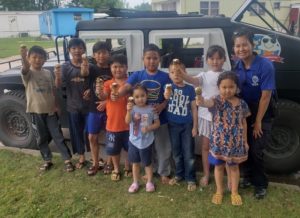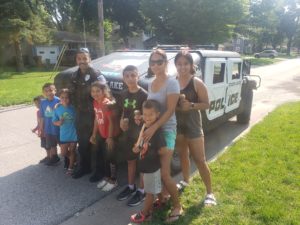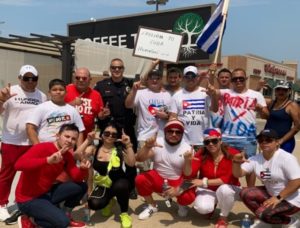Blog Post: Community Trust Q&A with Chief Cole
September 1, 2021
Law Enforcement Immigration Task Force Blog
When immigrants feel safe in their communities, we all benefit. To ensure public safety, it is critical for law enforcement officers to build effective relationships with members of their respective communities – regardless of background or immigration status. To learn more about how police departments can build trust with immigrant communities, the LEITF reached out to Storm Lake, Iowa Police Chief Chris Cole, who shared how his department has been successful in strengthening community relations.
- What challenges did your police force face when trying to engage with the immigrant community, and how did you overcome them? What strategies did you use?
Gaining community trust is a big challenge. Many of our immigrants come from countries with corrupt law enforcement. We try to build trust one positive interaction at a time. Every police contact is important because every contact could be the one contact that they talk about for the rest of their lives.
We have found that in our immigrant communities, children often have a higher social capital than non-English-speaking adults. Adults that don’t speak English will often rely on their English-speaking children to help them make family decisions. For this reason, winning the trust of the children is just as important as gaining trust with adults.
Building trust is a slow process that doesn’t happen overnight. It’s something our officers work on daily. We encourage officers to get out of their cars and conduct foot patrols through neighborhoods. We also encourage stopping at ethnic shops and stores to interact with community members.
Partnerships with the school district, churches, and other community minded groups allow our police officers a chance to engage the public in non-enforcement situations, i.e., participating in food outreach, vaccination clinics and other community events.
We try to meet with our residents in their own neighborhoods, where they’re the most comfortable vs trying to get them to come to us. Last year we repurposed a military HumVee and equipped it with an ice cream freezer. The vehicle, now dubbed “The YumVee” is used primarily for community outreach. Officers paired with bilingual Community Service Officers (CSOs) drive the YumVee into our neighborhoods where they engage with immigrant community members and give away free ice cream.
The YumVee has been well received in Storm Lake. Many families ask to take photos of their children with the officers and the YumVee. These photos are often posted online by the families and serve as positive publicity for the department within the immigrant communities.
Bilingual staff members and having a diverse police force also helps officers to better understand the different cultures and helps builds a trust between the immigrant communities and the police.

- Do you have any advice for other departments on how to promote building trust with immigrant communities that specifically helped your department in the process?
My advice is to encourage officers to police with empathy and to not be afraid to learn a second language. Learning another language forces, a person to get out of their comfort zone. It also allows officers to better understand how difficult it is for non-English speakers to navigate through normal day to day activities without understanding the language. Being empathetic to the struggles and difficulties immigrants face is paramount when policing in diverse communities.
A few years ago, I decided that I wanted to learn Spanish so that I could communicate better with our non-English speaking population. Once I learned the basics, I began making short posts and videos in Spanish on our department Facebook page. It was difficult, because I knew I was mispronouncing words and making mistakes, but the Spanish speaking population in our city really appreciated it.
We learned that many of our non-English speakers felt marginalized. They felt like they were expected to “just figure things out”. When community members see police officers (including the chief) trying to speak their native language, they really appreciate it. Our agency now offers language incentive pay to officers and staff who speak other languages or want to learn.

- What feedback, positive or negative, has the community given to your department on community building strategies? Have you implemented any of their suggestions?
Regardless of what you do, there will always be critics. We have received negative criticism for posting in other languages etc., However, the majority of the feedback we receive is positive.
Last year some of our officers were talking to some middle school kids in a city park located next to our police department. The officers were playing catch with a football with the kids. One of the kids did not know how to throw a football and told the officers that he was not a football player. He stated that he was a basketball player but said there were no centralized public basketball courts in our city. He was correct in what he said, all the public basketball courts in our city were located near the lake or on the outskirts of the city. There were no public courts in the center of town. One of the officers suggested that we (the police department) should try to fund and build a public basketball court in the park next to the PD. That was the day that the idea of “Operation Hoop Dreams” was born.
We applied for a community grant to build a half-court basketball area in the park. The public overwhelmingly agreed with the idea, but many community members wanted a full court rather than a half. We subsequently partnered with some investors and built a full basketball court in the park next to the PD. We plan to use the court for community outreach events and to host free youth basketball clinics.
- Do you have any future plans for community engagement that you plan to implement? If so, how do you think they will help build trust and improve relationships within the immigrant community?
We are currently planning “Tacos with a Cop” at one of our taquerias. We’re using the event to help kick off Hispanic Heritage month on September 15th. We’re buying tacos for the first 100 people through the door and hope to get our high school mariachi band to play music at the event. This will be our 1st “Tacos with a Cop” outreach. We hope to have several more and move them to various Storm Lake taquerias.
We also recently announced a partnership with The Bridge of Storm Lake (a nonprofit youth organization). Through The Bridge of Storm Lake’s youth-run enterprise, Endless Sea Coffee, at risk kids learn how to roast, package sell and market coffee. Kids at the Bridge will be making SLPD blends of coffee available to purchase in support Storm Lake Police Department’s community outreach events. All of the SLPD proceeds from the sales in the partnership will go back into the community through our outreach programs.

*Learn more about the Storm Lake Police Department by checking out their department Facebook page at https://www.facebook.com/Storm-Lake-Police-Department-145014222206994



